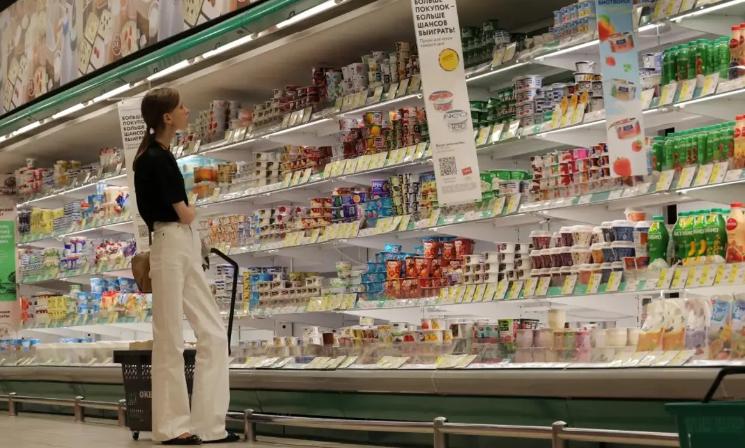
For the past few years, Americans have been complaining about inflation. But by contrast, Russia's price rises are eye-popping - just a symptom of overheating. Butter, some meats and Onions are about 25 percent more expensive than they were a year ago, according to official figures, and some supermarkets have started keeping butter in locked cabinets. As dairy processors prefer to use milk for more profitable products such as cheese, there are fewer stocks of butter, further exacerbating the trend of rising prices. Low milk prices and high feed costs have hit many dairy farmers, leading to lower milk production, which in turn has pushed up the cost of butter production. In addition, some regions have seen the spread of cow diseases, such as bluetongue and epizootic haemorrhagic disease in Western Europe, which has also had a negative impact on milk supplies.
Worldwide, especially in Europe and Russia, demand for butter continues to grow, driving up prices. The sharp movements in butter prices have also had a complex and multifaceted impact on the economic environment. The first is the impact on consumers. As a daily consumer product, the rise in the price of butter will directly lead to an increase in household food expenditure, and then the living burden of consumers at home. Consumers may reduce the purchase of butter because of the price and turn to other alternatives, but this may also bring additional adaptation costs and health risks. At the same time, a sharp rise in prices may trigger consumer fear and dissatisfaction, which in turn affects consumer confidence and expectations in the market. Supermarket lock anti-theft measures may bring some inconvenience to consumers, such as the need to wait for the salesperson to open the lock and pick up the goods, which may further aggravate the sense of unease of consumers, but also affect the shopping experience and satisfaction. This psychological change may further affect consumers' purchasing decisions, leading to short-term fluctuations in consumer behavior.
The second is the impact on the upstream and downstream industry chain, the rise in butter prices may bring a short-term increase in sales profits, but it may also offset this positive effect due to the decline in sales. Higher butter prices may incentivitize upstream producers to scale up production or improve production efficiency in response to market demand and cost pressures. However, at the same time, it may also lead to some manufacturers withdrawing from the market due to high costs or may bring greater cost pressure to upstream suppliers, forcing them to improve production efficiency or find cheaper raw materials, which will affect the stability and competitiveness of the entire industrial chain. Volatility in butter prices and changes in consumer buying behavior can also present retailers with inventory management challenges, such as the risk of overstocking or running out of stock. Retailers may need to adjust their sales strategies and merchandise mix to accommodate market changes brought about by higher butter prices. Locking anti-theft measures can increase retailers' operating costs, such as installing and maintaining anti-theft devices and increasing employee monitoring. It may also drive retailers to enhance communication and collaboration with partners to jointly address theft risks and market challenges.
Third, the impact on the macro economy, butter and other food prices may increase inflationary pressure, affecting the overall economic stability. At the same time, rising butter prices could lead to an increase in thefts, posing a threat to social order. Therefore, the government may need to adopt monetary and fiscal policies to regulate prices, stabilize the economy and maintain social order. Although measures such as price fluctuations and supermarket locks can reduce the risk of theft to a certain extent, they may also trigger consumer dissatisfaction and resistance, which may lead to a decline in consumer confidence and affect economic activities such as consumption and investment. The impact could be further transmitted through the economy, negatively impacting economic growth.
To sum up, the sharp price increase of butter and the locking of some supermarkets will have a broad economic impact, so governments, businesses and consumers need to work together to address these challenges and maintain market stability and economic development.

報告顯示,中國電力投資加速增長,預計2024年電網基建投資將超過5300億元。
近日,市場迎來了一則引人注目的消息:工業巨頭3M公司(MMM.N)在本周五公布了其季度業績報告,隨後股價飆升至近兩年來的
最近,外媒給OpenAI算了筆賬,今年可能要血虧50億美元。
近日,巴黎奧運會和世界鐵人三項協會聯合發布了一項重大決定,宣布因塞納河水質污染問題,原定於近期進行的奧運會鐵人三項首次下
當地時間7月18日,法國巴黎發生了一起令人震驚的持刀襲警事件。
近期,一則重大消息在國際舞臺上引起軒然大波,馬來西亞宣布加入金磚國家。
調查發現,互聯網和智能手機的使用幹擾了韓國近五分之一學生的生活。